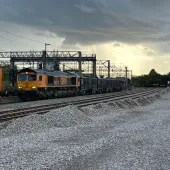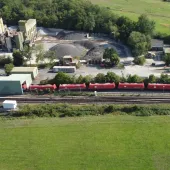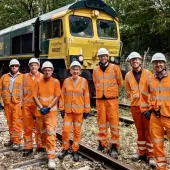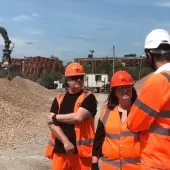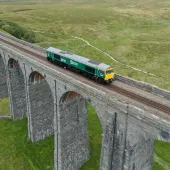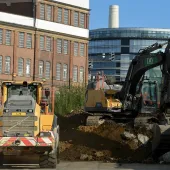HS2 to deliver more space for rail freight

DC Rail highlight the benefits of increased capacity on the existing rail network for rail freight
HS2 Ltd have today (21 July) unveiled a new video showing how Britain’s new high-speed railway will provide a greener future by allowing new train paths on the existing network that can be used to move more goods by rail.
‘HS2: Greater capacity for rail freight’ features Derby-based rail freight company DC Rail, who specialize in moving construction materials by rail. They are part of Cappagh Group, a family-owned group of companies that provides construction services.
As part of a multi-million-pound investment, Cappagh are currently constructing a new rail freight terminal in Wembley, on the West Coast Main Line, that will help them offer new rail services to customers in London.
However, the West Coast Main Line is currently the busiest mixed-use railway in Europe and is effectively full, which means there is a lack of additional space to run more freight services on it.
But building HS2 will change that. It will free up a huge amount of space on the existing railway by placing high-speed services on their own pair of tracks.
Once HS2 is operating, many more train paths will be available for use by freight services, and once further phases of the high-speed railway are built, additional capacity will be available on the East Coast and Midland main lines too.
Ben Rule, infrastructure management director at HS2 Ltd, said: ‘HS2 will unlock much-needed capacity on the West Coast Main Line and eventually on the East Coast and Midland main lines as well.
‘This additional space can be used by both passenger and freight services, reducing both car and lorry journeys and, in turn, the amount of carbon emitted by transport, helping Britain to reach its goal of net zero emissions by 2050.’
David Fletcher, director of rail at Cappagh Group of Companies, added: ‘Using the rail network to move goods is vital in order to take lorries off roads and reduce carbon emissions in Britain.
‘We are committed to expanding our operations, demonstrated by our investment in a rail freight terminal in Wembley, but it is the arrival of HS2 that will be vital, as it will provide more space on Britain’s railways for us to do more.’
Rail freight has a key role to play in the low-carbon economy as rail produces 76% less CO2 emissions than the equivalent road journey. By allowing more freight to travel by rail, HS2 will help reduce carbon emissions, improve air quality and make the UK’s motorways safer.



